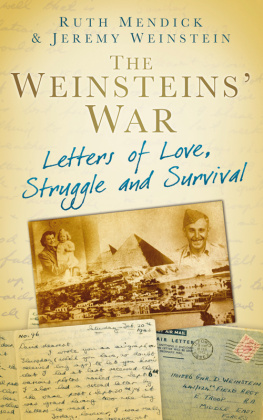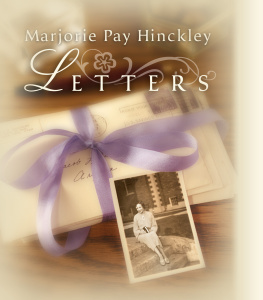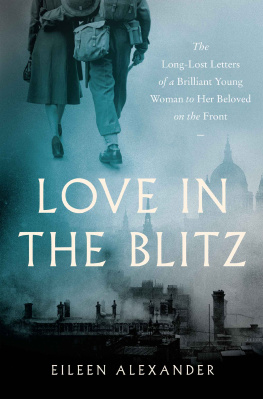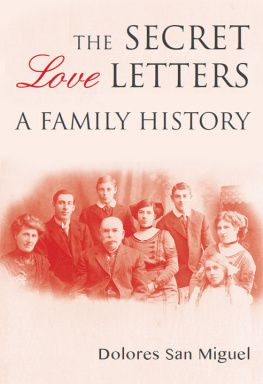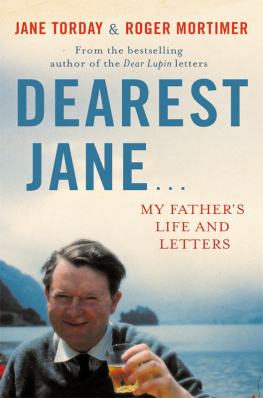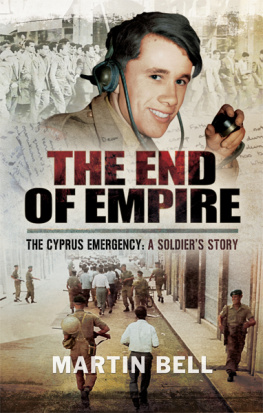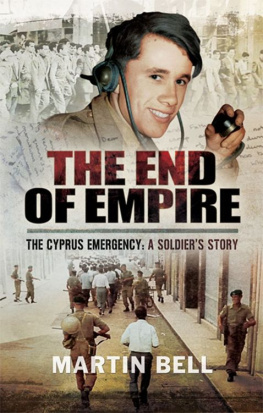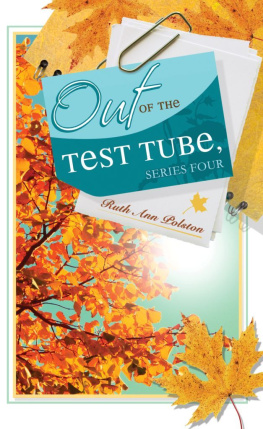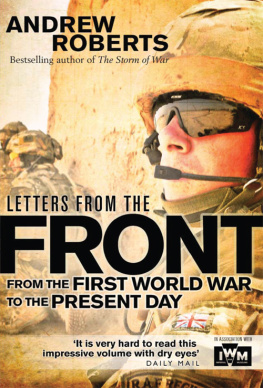
C ONTENTS
T HIS IS THE STORY of the Second World War as experienced by one young family, David and Sylvia Weinstein and their little daughter, Ruth, and discovered through the 700 or so letters that they sent to each other. The letters begin in 1942, when David first went abroad on active service (having joined up in 1940), through to his discharge home in 1946.
Davids war was a busy one. As a soldier in the Eighth Army, a gunner, he fought at El Alamein in North Africa and was then at the landings in Sicily, which then led to his trek through Europe, including being part of the barrage supporting Operation Market Garden. He ended the war as a member of the Army of Occupation in Germany. As the regimental tailor, he turned up sleeves, sewed on insignia and oversaw the work of a group of Germans who were part of his team. Here he had a coat made for Ruth: it was too big for her but she would grow into it, he writes, a metaphor, perhaps, for his life in the services. He survived, even thrived, by developing physically, socially and psychologically, growing into his uniform so that it fit every contour of his being, with a tucking-in here and an addition there. David was at times enormously proud of what he had become, and sometimes he felt distinctly uncomfortable. His letters provide fascinating insights into the battles he fights and also the extraordinary ordinariness of the routine life of a soldier. He continually observed and commented upon the cities, towns and villages he passed through and the people he met: refugees, families he was billeted upon, women who turned to prostitution and black marketeers, as well as his fellow soldiers. There were some light moments alongside the grim or exciting: he helped milk cows and deliver babies, he had Sylvia send him subscriptions to socialist papers like The Daily Worker and Reynolds News and asked also for mysteries and westerns with names like The Mystery of the Semi-Nude and She Strangled Her Lover (letter dated 12.07.44).
He was helped throughout by his knowledge of Yiddish, learnt back home with his family and in the Jewish East End of London, which lent itself so well to the mix of German and Dutch that became the language of wartime Europe. This background also gave him a sharp interest in the Jewish/Palestinian soldiers that he met at various points and there is poignancy in his friendship with the German Jews he encountered on their return from the camps. These experiences, along with the marking of the various religious festivals while out in the field, even under fire, left David intensely aware of what it meant to be Jewish at this momentous time in the worlds history. David kept a political eye open on all that he saw and read, and showed his intense excitement for the post-war Britain, and Europe, that was emerging. Having helped achieve the victory in war, the letters end with him anticipating the part that he and Sylvia can play in helping a Labour Britain win the peace.
Sylvias war, on the Home Front, was no less eventful or dangerous. In retrospect we know that the worst of the Blitz was over, but her letters reveal the continuing fear of danger, death and destruction from the skies and the constant struggle to adjust to and cope with the deprivations and fears of what has been termed the first example of total war. An especially significant factor for Sylvia was that she had recently left, or escaped, her large, close but complicated family after becoming a wife and a mother and sharing a business with David. Then, in April 1941, they were bombed out and she found herself back with her family. This was initially with her sister Fay, in Ilford, in a small premises above a grocers shop that had to be shared with Fays own young family, two boys aged 5 and 7 plus a sister-in-law, Betty, aged 19. David and Sam, Fays husband, were also there when on leave from the army. Sylvia and Ruth then moved, in 1944, to Frome, Somerset, where other family members had gone to escape the London bombings. Sylvia finally returned to set up home in Walthamstow, still in East London. While much of the literature about women in the war is about how they found new, transformational roles for themselves, either in such settings as the Land Army or in work (as in the iconic figure of Rosie the Riveter (also see the accounts collected by Nicholson, 2011)), Sylvias was a more internal, domestic struggle to survive; she describes herself as the odd one in her family (08.12.42), managing what we would now call a single-parent family. She organised rations, dealt with the continued bombings, negotiated with the authorities and weathered the tensions and rivalries within her wider family, while parenting her own daughter and sustaining Ruths muddled relationship with a father that was missing at such a crucial time in her young life as she grew from being a toddler to having her first day at school.
Both David and Sylvia had an urgent need to share the details of their own world and to know as much as possible of their spouses experiences to enter their parallel life as fully as possible. Thus David seized on the smallest details of Sylvias domestic circumstances and of Ruths development while Sylvia listened to the radio, followed the papers, watched the newsreels and equally avidly awaited and devoured Davids letters. They used the letters as best they could to continue the intimate relationship of a still-new marriage that had been so rudely interrupted by the war and which no one knew when or if it would be resumed. This is a conversation about war, religion and politics as well as the more intimate aspects of family, love and sexual longing. The importance of the correspondence is most eloquently expressed by David and Sylvia themselves. Thus Sylvia writes how it does seem to bring us closer to one another. I can feel your presence when I read those dear letters that you write these days (03.05.43), while David refers to how I can have spiritual contact with you by writing (19.05.43). In the extracts that follow Davids spelling has not been corrected he jokingly defends his spelling as modern against Sylvias old fashioned approach (21.08.45).
While the letters provide a very striking story of their lives and struggles they do not, of course, provide a complete story. At their most basic they can be just a tick-box affair. A pre-prepared letter (27.10.44) from the senior Jewish chaplain leaves spaces for the Revd Levy to write in Mrs Weinstein, followed by the typed I have to-day seen, with your husband again there by hand, followed by the typed I am sure you will be pleased to know that I found him well and in good spirits. The reverend does apologise for the very impersonal form of note. David sends (07.07.45) a field service postcard, which has a number of phrases that can be struck out as appropriate. The choice includes such bald statements as been admitted to hospital because of sickness or wounds, a letter, telegram and/or parcel has been received or complaining that no letter has been received either lately or not at all. David ticks the message I am quite well, letter follows at first opportunity. There were telegrams for urgent news, airgraphs which were very short and so necessarily to the point, letter-cards and, most valued in terms of length, airmail letters, which could take four to five months to reach their destination. Sylvia and David were clear about their preferences, David writing (20.12.42) that:
[Y]our air-graphs are very sweet tasters, but your letters are like a jolly good feed, and though they take so long & contain old news, never-the-less they are more than welcome.
The letters were also written in the shadow of the censor. The unit commander was expected to scrutinise all correspondence to prevent the leaking of sensitive military information and to assess the mood of the men. Consequently soldiers tended to entrust their more personal thoughts to the green envelopes which were less often opened at source, and, even then, would be opened by the base commander who was more distant from the men and so was less likely to know them personally. There was also self-censorship, giving the letters a cautionary feel as they struggled to find a way to talk to each other about their fears, frustrations and intimacies. David apologises (23.09.44), wishing that he had the nack of expressing my-self, while Sylvia (18.08.42) comments:
Next page
